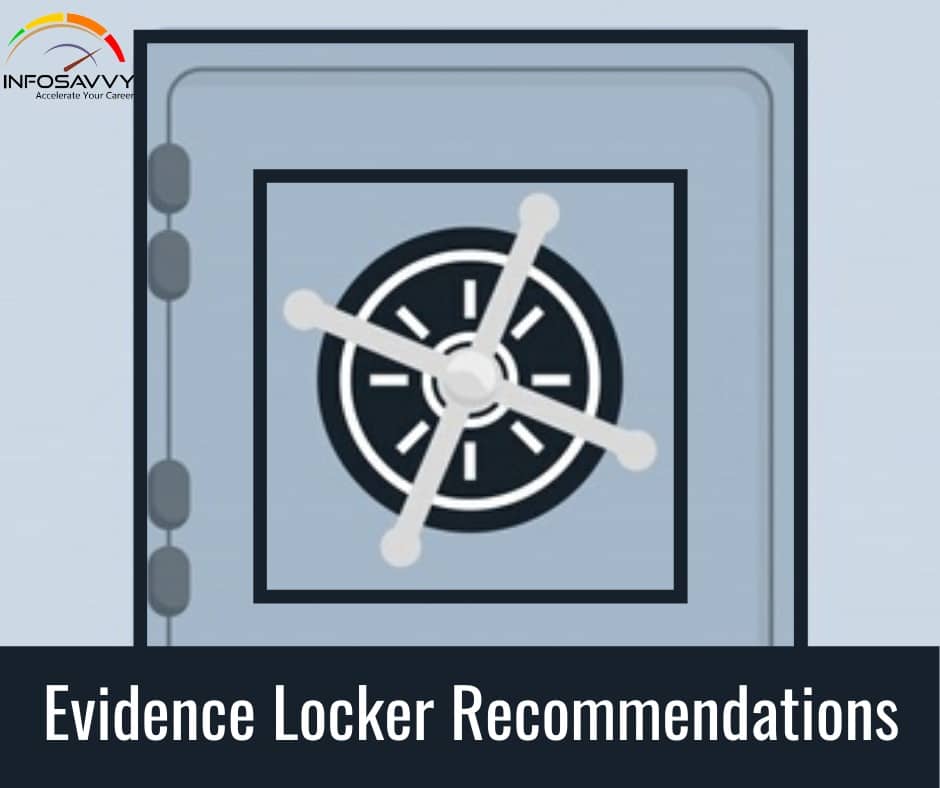The Evidence Locker Recommendations are the evidence storage devices and need protection from unauthorized access by using high-quality padlocks and performing routine inspection to check the content of the evidence lockers,
Recommendations for securing evidence lockers:
- Place these containers in restricted areas, which are only accessible to lab officers.
- A minimum number of authorized people should be able to access the evidence.
- Keep records about the people authorized to access the container.
- Close all the evidence lockers when not under direct supervision of an authorized person.
Best practices for using a combination locking system for evidence lockers:
- Provide the same level of security as for the evidence in the container.
- Store the combination in a separate equally secured container.
- Eliminate all the other combinations ever used before setting up a new
- Only authorized personnel should have access to change the lock combinations.
- Change the combination after every six months or whenever any authorized personnel leaves the organization.
Best practices for using a keyed padlock:
- Appoint a person for distributing keys.
- Stamp every duplicate key with sequential numbers.
- Keep a registry that lists the authorized people for each key.
- Perform monthly audits to ensure that no authorized person has lost a key.
- When the responsible person changes, maintain a record of all the keys.
- Put the keys in a locked container, which is accessible only to the lab manager and key custodian of the lab.
- Maintain the same level of security for keys as for evidence lockers.
- Consider changing the locks and keys yearly. If a key is missing, replace all the related locks and the keys.
- Do not maintain a single master key for many locks.
Related Product : Computer Hacking Forensic Investigator
Use evidence lockers made of steel with an external padlock or internal cabinet lock. Acquire a safe that offers high-level protection of evidence from fire damage. If possible, use safes
designed to protect electronic media. The evidence storage room can also be helpful in a self-owned computer forensics lab. The evidence room should have the same construction and
security as the lab. This room also requires an evidence custodian and a service counter. Maintain a log that lists the time of opening and closing an evidence container. Preserve these logs for at least three years or longer.
Auditing the Security of a Forensics Lab
Inspect the lab on a regular basis to check for proper implementation of the designed policies and procedures. The forensics lab should be under surveillance to protect it from intrusions.
Some of the steps to check for security policy compliance:
- Check the fire extinguishers manually to ensure their functioning.
- Examine the ceiling, floor, roof, and exterior walls of the lab at least once a month to check for structural integrity,
- Examine the doors to ensure they close and lock correctly.
- Check if the locks are working properly or if they need replacement.
- Examine the log register to make sure all entries are correct and complete.
- Check the evidence container log sheets regularly to keep a record of their opening and closing.
- At the end of the workday, acquire unprocessed evidence and store it in a secure place
CHFI v9 provides the necessary skillets for identification of intruder’s footprints and gathering necessary evidence for its prosecution. If you are interested to learn in detail Computer Hacking Forensic Investigator then take training from best institute in mumbai.
Human Resource Considerations
Human resource refers to the trained professionals required to perform a series of functions for an organization or firm in order to complete a bigger objective. Every company has a department of human resource professionals, who are responsible for finding and recruiting the skilled employees for their company.
In the case of a computer forensics laboratory, key job roles include lab cybercrime investigator, coordinator, lab director, forensic technician, forensic analyst, forensic scientist, etc. As part of the human resource consideration, estimate the number of personnel required to deal with the case based on its nature and the skills they should have to complete the tasks, Interview the appropriate candidates and recruit them legally, Ensure they have certification pertaining to their job roles.
Also Read : Physical Security Recommendations of Computer Forensics Lab
Computer Forensics Investigator
Hiring a computer forensics investigator is a vital step in computer forensics. The investigator is a person who handles the complete investigation process, for example, preservation, identification, extraction, and documentation of the evidence.
Skills essential for a computer forensics investigator are:
- Knowledge about general computers such as hardware, software, OS, applications, networking, etc.
- Experience in performing a proper investigation to protect digital evidence.
- Must have certification from authorized organizations.
For searching and seizing some crime evidence, a search warrant is required. A law enforcement officer is the person who persuades a judge that issuing a warrant is necessary. The judge first prepares an affidavit containing the reason for the search and the area of the search The affidavit also gives a limited right to the police to violate the suspect’s privacy.
Law Enforcement Officer
The law enforcement officer should have the following essential skills:
- A lawyer and have knowledge of general computer skills
- Have knowledge of all cybercrime laws
- Must know the way to write an appropriate warrant for searching and seizing a computer
Lab Director
The lab director/manager is responsible for adhering to a specific set of industrial standards. A lab director regularly reviews and manages case-related processes, Apart from regular duties, a lab director needs to promote group consensus in policy making or decision making, understand lab needs, ensure that staff members adhere to ethical standards, and plan for updating the lab.
The prime duty of a lab director is to maintain quality during the entire process of a computer forensic investigation: outlining the case and the path to follow, evidence logging, lab entry privileges, guidelines in filing reports, understanding the lab’s status and ensuring its efficiency, and setting production schedules in the investigation process. The director is responsible for lab policies, and the safety and security of the evidence and staff. The lab director is also responsible for day-to-day investigation activities in the lab. Duties even include lab funding and expenditure management.
A lab director must also:
- Have a wide range of forensic knowledge
- Anticipate staffing, equipment, and training needs
- Help ensure compliance with the Quality Assurance (QA) requirements
Questions related to this topic
- What are the investigative procedures involving computer forensics?
- How do computer forensic scientists find evidence?
- What happens during a digital forensics investigation?
- What are the four steps in collecting digital evidence?
This Blog Article is posted by
Infosavvy, 2nd Floor, Sai Niketan, Chandavalkar Road Opp. Gora Gandhi Hotel, Above Jumbo King, beside Speakwell Institute, Borivali West, Mumbai, Maharashtra 400092
Contact us – www.info-savvy.com



